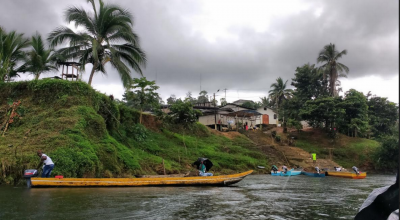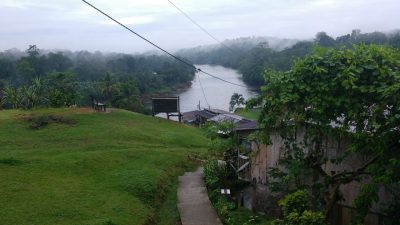This project is made possible through the partnership of WATER CHARITY and the NATIONAL PEACE CORPS ASSOCIATION. ![]()
This project has been completed. To read about the conclusion, CLICK HERE.
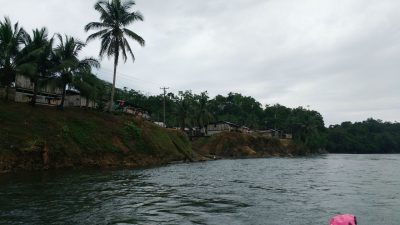 Location
Location
San Miguel Negro, Guadual and Telembi, Parroquia Telembi, Cantón Eloy Alfaro, Esmeraldas, Ecuador
Community Description
Set on the banks of Río Cayapas, a river in Esmeraldas Province in northwestern Ecuador, the communities of San Miguel Negro, Guadual, and Telembi depend on this vast and isolated waterway for their way of life – the river and its tributaries provide not only water supply, food, and livelihoods, but also the region’s only mode of transport. However, this way of life is threatened by the local expansion of extractive industries (logging, mining, and monoculture of African oil palm) and unplanned accompanying road infrastructure investment, two trends which facilitate the exploitation of local natural resources while further isolating local communities and causing myriad new social problems.
Telembi is one of Ecuador’s poorest parroquias (the smallest territorial division), measured both by rates of poverty (the only non-Amazonian parroquia with over 80% of the population living in poverty per the 2014 census) and by lack of access to basic services (100% of the population lacked access to at least two public services according to the 2010 National Census).
With a combined population of around 1,100 people, nearly all of the three communities’ residents are Afro-Ecuadorian and Chachi indigenous, and many families continue to combine subsistence farming and hunting/fishing with seasonal monetary income from cocoa cultivation and small-scale logging to provide for themselves. However, over the last 10 years, community management of conservation areas through the Ecuadorian state’s novel pay-for-conservation program, Sociobosque, has provided an important tool for locally-managed development, supporting the public works projects and capital for community-run businesses (such as eco-tourism, transportation, and co-op stores).
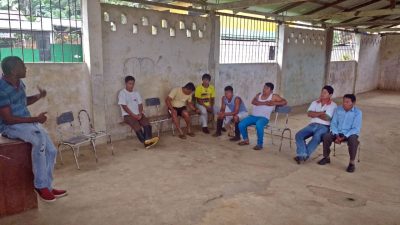 Problem Addressed
Problem Addressed
As in the rest of rural Esmeraldas, these communities suffer from the lack of access to nearly all basic services and minimal attention from state and outside actors. Even Telembi, the parish seat, generally does not receive sufficient resources to meet its own population’s needs, much less those of the rest of the extensive parish.
While limited prior efforts were made by NGOs around a decade ago to implement potable water systems in San Miguel Negro and Telembi, a complete lack of administrative/technical training and follow-up by project implementers led to the rapid collapse of these systems once repairs were required. Luckily, rather than embittering the communities towards the projects, these past failures have motivated the local population to seek a definitive, lasting solution.
Their drinking water needs to grow more pressing every day, with the river becoming more contaminated by the combination of the expansion of mining activities, deforestation/erosion from other land uses, and the growth of upstream populations and their detergent use, solid waste and sewage disposal, and animal husbandry.
Project Description
This project is to build a water system in each of the three communities.
Green Empowerment (GE) and their Ecuadorian local partner organization Fundación de Desarrollo de Alternativas Comunitarias de Conservación del Trópico (ALTROPICO) will work with the target communities to:
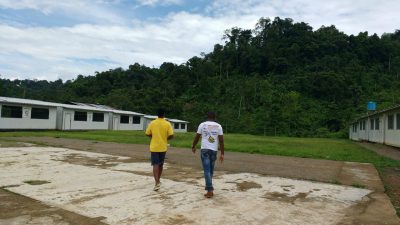 1) Construct three centralized potable water systems serving the communities of San Miguel Negro (48 households), Guadual (32 households) and Telembi (110 households) and their three schools and one clinic with individual metered household connections, ensuring that the water provided meets Ecuadorian national standards for drinking water.
1) Construct three centralized potable water systems serving the communities of San Miguel Negro (48 households), Guadual (32 households) and Telembi (110 households) and their three schools and one clinic with individual metered household connections, ensuring that the water provided meets Ecuadorian national standards for drinking water.
These systems will incorporate previously-constructed storage tanks in San Miguel Negro and Telembi, and include new installations of all other system components (catchment, conduction lines, treatment, reservoirs, distribution lines, and household connections) and will use centralized bio-sand filtration and/or chlorination to assure consistent water quality.
To help ensure that the project has positive health impacts for beneficiaries, and to support system sustainability and community resilience for years to come, GE will seek funding from other sources to implement the following project components:
2) Training for at least 55% of community members on water, sanitation, and hygiene (WASH) topics and watershed management best practices.
3) Guidance for each community to form a water committee to manage system use and maintenance, including collecting usage fees.
4) In-depth training for three locally-elected water committees on WASH, organizational, technical, and administrative aspects of water system management.
Beneficiaries will contribute $11,000 in cash investment for system materials, in addition to unskilled labor, logistical support (materials transportation), local materials for water system construction, and existing system infrastructure in Telembi and San Miguel.
In addition, beneficiaries in each community will form a water committee to manage system use and oversee regular maintenance, collect usage fees, and participate in continuous training opportunities provided by GE, ALTROPICO, the national water secretariat SENAGUA, and other local actors.
Project Impact
1,100 people will benefit from the project.
Project Administration
Elise Kittrell, RPCV Peru (2014-2016), Technical Manager of Green Empowerment.
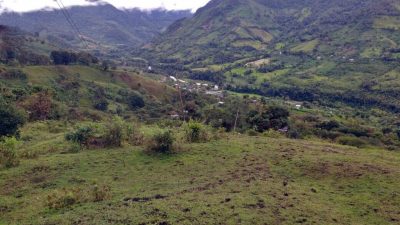 Monitoring and Maintenance
Monitoring and Maintenance
Prior to project implementation, baseline surveys will be conducted to assess the communities’ health, current water access, and knowledge on water, sanitation, and hygiene (WASH) best practices and water system operation, maintenance and administration. With this information, the project work plan will be developed with the community, ensuring the technology and training provided is what is needed and will continue to be utilized after project completion.
A community-elected committee will be formed and trained on proper water system administration, operation, and maintenance. This committee will be in charge of managing the water system, making sure potable water is being delivered to the households, maintenance is conducted in a timely manner, and payments from beneficiaries are received on time.
The water system committee will also be provided manuals on these topics to use as a guide if they have questions in the future and will be able to contact ALTROPICO if needed. Community members will also receive interactive water, sanitation and hygiene training on topics such as water use and storage and proper handwashing. Community members will be required to participate in this training in order to receive a household water connection.
Once the project construction and training are completed, follow-up surveys will be done to check for knowledge learned by the water system committee and community members and a final walk-through of the water system will be conducted.
By implementing in-depth training programs and installing three centralized systems to provide potable water in three communities, we will motivate the beneficiary communities to maintain and potentially expand their current conservation areas while providing clean water to approximately 1,100 residents, improving health outcomes, reducing time spent gathering water, and freeing up time and energy for other productive activities.
Linking training activities for the three water committees will create a stronger local base of technical and administrative expertise, reducing the need for outside trouble-shooting once the systems are operational and increasing the visibility of the efforts to motivate other nearby communities.
We will evaluate the project through field reports, documentation, and photos from each training session, in addition to attendance lists and their comparison to overall population numbers. Additionally, we will conduct baseline and post-project surveys on diarrheal disease incidence in each community and focus groups at the end of the project with community members to gather additional qualitative data and community feedback on the project and its impacts.
Comments
The anticipated project outcomes are to decrease disease incidence in three communities and promote conservation/prevent contamination of the springs and watersheds upon which they depend. These actions will provide new local water committees and their communities in general with additional tools to improve local health and environmental management practices, working together to protect the critical downstream buffer areas of the Cotacachi Cayapas reserve and the area’s major water resources.
Project Funding
The funds to get this project underway have been provided by the Paul Bechtner Foundation. We continue to accept donations so that we will have funds on hand for the next project in Ecuador. Please use this Donate button, and your donation will be attributed to this project and the project director will be notified.
![]()
